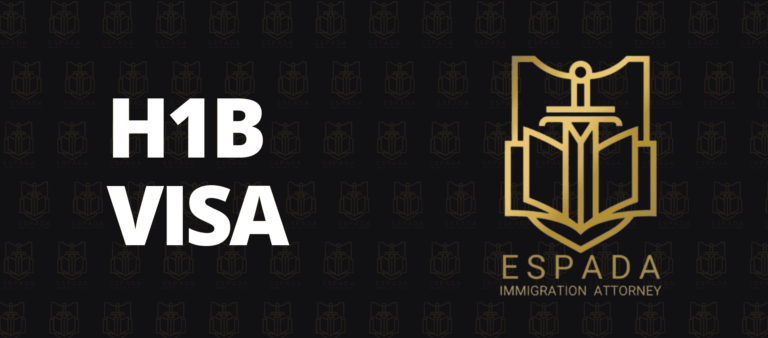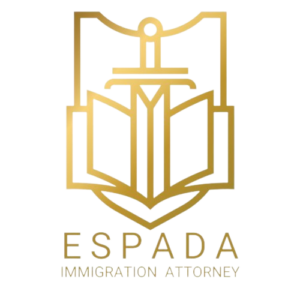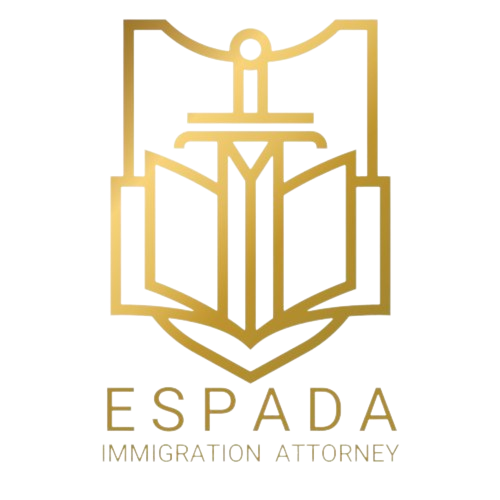H1B Visa Comprehensive Guide : All You Need to Know
H1B Visa Comprehensive Guide : All You Need to Know

The H1B visa provides an excellent opportunity for foreign nationals to work in the United States if they have a valid job offer. This guide will cover all the essential details about the H1B visa to help you understand the process and requirements.
If you have any questions about the H1B visa, feel free to reach out to me directly at Abbas@espadaimmigration.com. I am highly responsive to emails and would be happy to assist you with your concerns.
Introduction
The H1B visa is specifically designed for foreign nationals seeking to work in the United States in a “specialty occupation.” These roles typically require a minimum of a bachelor’s degree or an equivalent combination of education and work experience.
Overview:
What is the H1B Visa?
What are the Benefits of the H1B Visa?
What are the Requirements for the H1B Visa?H1B Visa Numerical Limitations
Who Files the Petition?
H1B Visa Process
H1B Visa Documents
H1B Visa Fees
H1B Visa Processing Time
Amending an H1B Visa
Recapturing TimeH1B Visa to Green Card
H1B Visa Exceptions
F1 Visa to H1B Visa
Conclusion
1. Understanding the H1B Visa
The H1B visa is a specialized work visa that allows foreign nationals to engage in specialty occupations within the United States. These occupations span various fields, including but not limited to:
- Architecture
- Engineering
- Mathematics
- Physical sciences
- Social sciences
- Medicine
- Health
- Education
- Business
- Law
- Accounting
- Theology
- The arts
To qualify, the position must typically require at least a bachelor’s degree or its equivalent. The job can be either full-time or part-time. Each fiscal year, 65,000 H1B visas are issued, with an additional 20,000 reserved for individuals holding advanced degrees (e.g., master’s or juris doctor) from U.S. institutions.
The H1B visa is initially valid for up to three years and can be extended for another three years, bringing the maximum duration to six years. H1B visa holders may also bring their spouse and unmarried children under 21 years old, who would hold H4 dependent status.
Additionally, H1B holders can change employers, provided specific conditions are met, and they may pursue permanent residency as the visa allows for dual intent.
2. Benefits of the H1B Visa
The H1B visa provides numerous advantages:
Legal Employment in the U.S.
The H1B visa enables foreign nationals to work in specialized occupations within the U.S., contributing their skills to the U.S. economy and benefiting themselves professionally.
Pathway to Permanent Residency
Although the H1B is a nonimmigrant visa, it allows individuals to apply for permanent residency (a green card) without jeopardizing their visa status. Unlike other visas requiring proof of nonimmigrant intent, H1B visa holders are not required to maintain a residence abroad.
Family Inclusion
H1B visa holders can bring their spouse and dependent children (under 21 and unmarried) to the U.S. on H4 status. While dependents can study in the U.S., they are generally not permitted to work unless certain conditions are met.
Job Portability
H1B visas include portability, meaning holders can change employers without disrupting their visa status, provided they follow the required legal process.
3. Eligibility Requirements for the H1B Visa
Meeting the requirements for an H1B visa involves several key criteria:
Job Offer from a U.S. Employer
The applicant must have a valid job offer from a U.S.-based company. This can be evidenced through a written contract or, in its absence, a detailed summary of an oral agreement.
Employer-Employee Relationship
The U.S. employer must demonstrate a valid employer-employee relationship. This includes the employer’s ability to control the terms and conditions of employment, such as supervision, work schedules, and evaluation.
Factors considered by USCIS to validate this relationship include:
- Provision of tools or equipment by the employer
- Authority to hire, pay, and terminate the employee
- Assessment of the employee’s work
- Offering employee benefits
- Including the employee in tax documentation
For off-site employment, additional proof of employer oversight may be required, such as detailed contracts or regular performance evaluations.
No Ongoing Labor Disputes
The workplace must be free from active labor disputes, such as strikes. If a dispute arises after petition approval, entry to the U.S. may be delayed.
Specialty Occupation Position
The role must qualify as a specialty occupation, requiring advanced theoretical or practical knowledge. Determination often involves referencing the following:
- Occupational Outlook Handbook (OOH)
- O*NET Online System
- Dictionary of Occupational Titles
The job duties, rather than the title alone, are analyzed. Other factors, such as industry standards, salary, and the business’s nature, may also be reviewed.
Educational Qualifications
The position typically requires a bachelor’s degree or higher in a specific field related to the occupation. If the degree was obtained abroad, USCIS may require a credential evaluation to ensure it meets U.S. educational standards.
Exceptions for Education Requirements
Applicants lacking the standard degree can qualify through a combination of education, training, and relevant work experience. For instance:
- A bachelor’s degree with five years of professional experience may substitute for an advanced degree.
- Three years of relevant work experience may equate to one year of formal education.
Documentation to support this equivalence can include:
- Evidence of specialized knowledge and skills
- Publications or awards in the field
- Licensure or professional memberships
Payment of Applicable Fees
The sponsoring employer must pay all required fees associated with the H1B petition.
Licensure (if required)
For roles requiring a license, the applicant must hold a valid license before visa approval unless exceptions apply.
Exceptions:
- States that allow unlicensed practice under supervision
- Research or teaching roles not involving direct patient care
4. H1B Visa Numerical Limits
A key aspect of the H1B visa is its annual numerical cap. Each fiscal year, 65,000 visas are allocated under the regular cap, with an additional 20,000 visas reserved specifically for individuals holding advanced degrees from U.S. institutions.
Petitions not selected in the lottery or submitted after the final deadline will be rejected. Additionally, applications missing essential documents or fees are also denied. This highlights the importance of carefully managing the H1B application process. Consulting an immigration attorney can significantly improve your chances of success.
The lottery system means many qualified applications are never reviewed. There have been proposals to reform this process, such as prioritizing high-paying or highly skilled roles, but the lottery remains the current standard.
A distinct lottery is conducted for advanced degree petitions, where candidates not selected in the 20,000-visa allocation receive a second chance in the general lottery.
H1B1 visa holders—reserved for citizens of Chile and Singapore—are exempt from the H1B cap. The annual cap for these categories is 1,400 for Chile and 5,400 for Singapore. H4 dependents of H1B visa holders are also excluded from the cap.
Certain organizations are exempt from the H1B visa cap, such as:
- Institutions of higher education or nonprofit organizations affiliated with such institutions.
- Nonprofit and governmental research organizations.
Additionally, these exempt organizations are not required to pay the ACWIA fee.
5. Who Files the H1B Petition?
H1B petitions must be filed by a U.S.-based employer, referred to as the petitioner, on behalf of the foreign worker, who is the beneficiary.
The petitioner must:
- Extend a job offer to the beneficiary.
- Establish a valid employer-employee relationship.
- Possess an IRS Tax Identification Number.
Only one petition per beneficiary may be filed in a calendar year. Submitting multiple petitions can lead to denial or revocation unless the first petition is delayed, in which case a second petition can be submitted with a proper explanation.
Separate companies within the same corporate group may file petitions for the same beneficiary if each has its own Federal Employer Identification Number (FEIN) and a genuine need for the role.
In some cases, an agent can act as a petitioner, especially if the beneficiary will work for multiple employers. All legal requirements must still be met if an agent files on behalf of the petitioner.
Immigration attorneys, such as myself or my team, can assist with preparing and filing H1B petitions.
6. H1B Visa Process
The H1B visa application involves several steps, which include:
- Registering during the H1B registration period.
- Filing an H1B petition if selected in the lottery.
- Receiving petition approval.
- Applying for a visa at a U.S. consulate if located abroad.
- Starting employment in the U.S.
Registration Period (Effective 2020)
The electronic registration system requires employers to submit separate registrations for each potential H1B worker, including advanced degree applicants. A $10 registration fee is required for each submission. If selected, the petitioner may proceed with filing Form I-129.
Submitting an H1B Petition
Employers must mail two copies of the petition—one original and one copy for consular processing—to the appropriate USCIS Service Center. Submission deadlines, such as April 1st, must be strictly followed to ensure consideration under the lottery.
Necessary documents for filing may include:
- Form I-907: Used if premium processing is requested.
- Form I-129 with Supplement H: Details about the petitioner, beneficiary, and job.
- A comprehensive packet with supporting documentation like the beneficiary’s passport copies, approved labor condition application, and employment offer.
Approval of the Petition
Approved petitions result in Form I-797 issuance. USCIS may issue a Request for Evidence (RFE) or Notice of Intent to Deny/ Revoke (NOID/NOIR) if additional documentation is needed. Responding appropriately can lead to petition approval.
Approved petitions are valid for up to three years, with potential for extensions. Any material misrepresentation or fraud can lead to revocation.
Applying for a Visa
If the petition is approved, the beneficiary schedules an interview at a U.S. consulate. A visa cannot be issued more than 90 days before the job’s start date. Documentation such as the approval notice and evidence of qualifications must be presented. Visa validity may differ depending on reciprocity agreements between the U.S. and the beneficiary’s home country.
Beginning Work in the U.S.
H1B workers may arrive up to 10 days before the start date on their petition and must ensure the accuracy of their I-94 card upon entry. Employment must end upon visa expiration unless extensions are approved.
7. H1B Visa Documentation
The following documents are generally required for an H1B visa application:
- Detailed job description.
- The beneficiary’s resume.
- Educational transcripts, certifications, and credentials evaluation (if applicable).
- Training certificates with curricula.
- Employer support letters (if applicable).
- Company details, including tax returns and business plans.
- Biographic pages of passports for the beneficiary and dependents.
- Approved labor condition application.
- Job postings for similar positions to support job description.
- Professional association statements (if applicable).
- Written contracts or summaries of agreements.
- Proof that a degree is required for the position.
- Evidence of licensure (if applicable).
This is not an exhaustive list, as documentation requirements may vary based on the case. Proper preparation and consultation with an immigration attorney can ensure a smooth application process.
8. H1B Visa Fees
The fees associated with the H1B visa application process are generally paid by the sponsoring U.S. employer or their authorized representative. However, some additional expenses, such as translation services, photocopying, or transportation costs, may be the responsibility of the visa beneficiary. It is important to note that the fees mentioned here are subject to change.
- ACWIA Fee: $1,500 for employers with 26 or more employees, and $750 for employers with 25 or fewer employees.
- Fraud Prevention and Detection Fee: $500.
- Additional Fee: $4,000 for employers with 50+ employees, where 50% or more of the workforce holds H-1B, L-1A, or L-1B status (if applicable).
- Form I-129 Fee: $460.
- Premium Processing Fee (Form I-907): $1,440 (this fee can be paid by the beneficiary if applicable).
9. H1B Visa Processing Time
The time required to process an H1B visa application can vary significantly depending on several factors, including:
- Whether premium processing was selected.
- The type of H1B visa being requested (e.g., cap-exempt, advanced degree, or regular).
- The USCIS Service Center handling the application.
- The U.S. consulate where the applicant will be stamped (if applying abroad).
Processing times can range from under two months to over nine months. Beneficiaries must also note that even with early approval, employment cannot commence until October 1st following the lottery.
10. Amending an H1B Visa
After an H1B beneficiary begins working in the U.S., certain changes to employment or job duties may require amending the visa or filing a new petition. For example:
- If the beneficiary changes employers or 50% of their job duties, a new petition is required.
- A change in worksite location necessitates filing a new Labor Condition Application (LCA).
- If the job ends unexpectedly, the beneficiary can remain in the U.S. for up to 60 days or until the visa expires, whichever is shorter. During this period, they may search for a new employer but cannot work.
An H1B visa is initially valid for three years and can be extended for another three years, subject to certain conditions. To file for an extension, the beneficiary must be in valid H1B status, and documentation demonstrating the continued need for their employment, such as pay records and evaluations, can strengthen the application.
11. Recapturing Time
The six-year maximum validity of an H1B visa only accounts for time physically spent in the U.S. Time spent outside the country during this period can be “recaptured” and added to the H1B validity.
For example, if a beneficiary spent a total of six weeks outside the U.S. over six years, they could extend their H1B status by those six weeks. However, only full days spent outside the U.S. are eligible for recapture; partial travel days do not count.
12. Transitioning from H1B Visa to Green Card
H1B visa holders have the option to apply for permanent residency (green card). Additionally, those waiting for an immigrant visa priority date may qualify to extend their H1B status beyond the six-year limit. Beneficiaries with approved EB-1, EB-2, or EB-3 petitions may also be eligible for extensions. An immigration attorney can provide guidance on navigating this transition effectively.
13. H1B Visa Exceptions
Citizens of Chile and Singapore qualify for the H1B1 visa, which offers unique benefits:
- Validity: H1B1 visas are valid for up to 18 months and can be renewed indefinitely.
- Quota: H1B1 applicants are not subject to the 65,000 visa cap.
- Occupational Flexibility: Some positions not considered specialty occupations under the H1B program may qualify under H1B1.
H1B1 applicants can apply directly at a U.S. consulate or through USCIS for a change of status. They can provide all required documentation at the consular appointment without prior approval.
14. Transitioning from F1 Visa to H1B Visa
Many beneficiaries transition from F1 (student) visa status to H1B status. F1 visa holders are eligible for one year of Optional Practical Training (OPT) after completing their education, with an additional 24-month extension available for STEM fields. OPT must be related to the degree earned and involve practical application of specialized knowledge.
Employers can file H1B petitions for F1 visa holders engaged in OPT, provided they meet all H1B requirements.
In cases where the F1 OPT period ends before H1B employment can commence, “cap-gap relief” allows beneficiaries to remain in the U.S. during the gap period, though they cannot work. This provision helps avoid unnecessary travel or costs associated with leaving and re-entering the U.S.
15. Conclusion
The H1B visa remains a popular choice for foreign nationals seeking to work in specialty occupations within the U.S. This guide provides a comprehensive overview of the H1B visa, including its benefits, requirements, and application process.
If you have any questions or need further assistance with your H1B visa application, feel free to email me at Abbas@espadaimmigration.com. I’m a U.S. immigration lawyer, and I would be happy to help you.
Why Choose Us
Choosing the right immigration lawyer can make all the difference in achieving your U.S. immigration goals. At Espada Immigration Lawyer, we are dedicated to providing exceptional legal guidance and personalized support through every step of the process. Our team combines specialized expertise, transparency, and an unwavering commitment to client success, making us a trusted partner for all your immigration needs.
- Specialized Expertise
- Personalized Approach
- Transparent Guidance
- Client-Centered Commitment

DISCLAIMER: This article is provided for general informational purposes only and does not constitute legal advice. The information herein should not be interpreted as formal legal counsel nor does it establish an attorney-client relationship. This article is neither intended as a solicitation for legal services nor as a substitute for individual legal advice. For specific legal guidance, please consult an attorney in your jurisdiction. Actions based on information in this article are taken at your own risk, and I disclaim any liability for such actions. Please note that information may have changed since publication and may no longer be current. This article does not offer guarantees, warranties, or predictions regarding the outcome of any legal matters. Each case is unique, and results will depend on individual facts and legal issues. Thank you.
ATTORNEY ADVERTISING: Any invitation to contact our law firm on this website and related pages constitutes attorney advertising.
